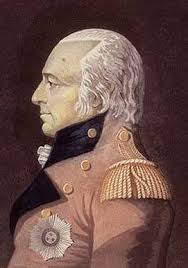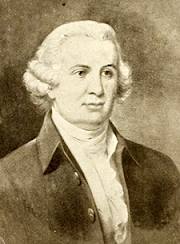 On 28 January 1781, two hundred civilian men marched out of Wilmington, North Carolina and greeted the advance of redcoats of the 82nd Regiment by laying down their weapons and surrendering. Major James Henry Craig, commander of the 82nd, hadn’t agreed to the articles of capitulation that two town leaders presented to him the night before. By his reckoning, if Wilmington’s civilians expected to prevent plunder, they had to obey his rules.
On 28 January 1781, two hundred civilian men marched out of Wilmington, North Carolina and greeted the advance of redcoats of the 82nd Regiment by laying down their weapons and surrendering. Major James Henry Craig, commander of the 82nd, hadn’t agreed to the articles of capitulation that two town leaders presented to him the night before. By his reckoning, if Wilmington’s civilians expected to prevent plunder, they had to obey his rules.
Major Craig initiated the occupation of Wilmington with the act of paroling the two hundred civilians. When word of the surrender and paroles reached patriot leaders elsewhere, many responded with disbelief, ridicule, and anger. Wilmington was an important port and one of the largest towns in North Carolina. In essence, North Carolina had surrendered to the redcoats.
The image of 18th-century Americans acquiescing to the occupation of their town by redcoats doesn’t sit well with many modern Americans citizens. History classes in the public school system leave students with myth-like impressions that the average civilian didn’t give up without a fight (“Red Dawn” anyone?); that those fighting civilians often won against trained British regulars; and if civilians didn’t fight, it meant they were cowards. Based on impressions like those, 21st-century Americans can make erroneous assumptions about the American Revolution. Several years ago, the editor of a traditional press rejected my first Michael Stoddard novel because she was certain the townsfolk of Wilmington wouldn’t have surrendered quietly.
So let’s look at why the townsfolk surrendered quietly on 28 January 1781.
In 1775, patriots in North Carolina ousted the state’s last royal governor, Josiah Martin. Martin fled, and from a British ship anchored off the coast, he continued to direct North Carolina’s loyalists. He encouraged Scottish loyalists to take up their broadswords for the King the following February at the Battle of Moore’s Creek Bridge. However patriots won that battle.
For the next five years, patriots controlled North Carolina. By January 1781, they’d grown somewhat complacent. Most of the fighting in the war was elsewhere. Wilmington was defended by two batteries and a militia unit commanded by Colonel Henry Young. Never mind that the militia didn’t have enough complete stands of arms to issue every man.
Thus the patriots dismissed the first report that the British were headed for Wilmington. The 82nd Regiment was only a few days away by the time patriot officials realized the invasion was genuine. By then, it was too late to defend Wilmington. Too late, even, for an orderly evacuation.
 William Hooper (a signer of the Declaration of Independence) and other patriot leaders fled. Some left with little more than the clothing they wore. Some, like Hooper, were forced to leave their families in Wilmington, subject to Major Craig’s mercy. Colonel Young and fifty patriot militiamen, outnumbered and lacking weapons, also fled at the request of townsfolk. Backed against the wall, the town’s civilian leaders gambled that Major Craig, finding no combatants or rebel leaders in Wilmington, would spare the town and its inhabitants.
William Hooper (a signer of the Declaration of Independence) and other patriot leaders fled. Some left with little more than the clothing they wore. Some, like Hooper, were forced to leave their families in Wilmington, subject to Major Craig’s mercy. Colonel Young and fifty patriot militiamen, outnumbered and lacking weapons, also fled at the request of townsfolk. Backed against the wall, the town’s civilian leaders gambled that Major Craig, finding no combatants or rebel leaders in Wilmington, would spare the town and its inhabitants.
It was a gamble that paid off for most of the year. The 82nd Regiment occupied Wilmington through November 1781, allowing most residents to go about their daily businesses and live in their homes while Major Craig used the town as a base from which the 82nd Regiment and its loyalist allies launched numerous aggressions along the coast and into the interior of North Carolina.
It takes a certain amount of courage to surrender to an enemy like the 82nd Regiment. What courage the civilians of Wilmington must have had.
**********
Did you like what you read? Learn about downloads, discounts, and special offers from Relevant History authors and Suzanne Adair. Subscribe to Suzanne’s free newsletter.

Dear Ms. Adair,
What would be interesting is if you contrast this with the Melian Dialogue http://en.wikipedia.org/wiki/Melian_dialogue
In some ways it echoes how the French(and other parts of Europe) reacted to German occupation in WWII.
Brave? Not necessarily and a surprising twist of phrase, as clearly surrender by the town would be viewed as traitorous, yet many soldiers and militia surrendered to the British.
What you don’t mention in your blog is whether the occupation contained collaboration with the British. There are choices each person makes, and this has been examined with more detail apropos the French Occupation—beyond surrender is there active collaboration on behalf of the citizens of Wilmington? A passive resistance? An emasculation of the people? What were Craig’s rules that you mention? Did they punish the town for surrendering? Were there reprisals ala General Butler’s Order 28 in New Orleans in the Civil War?
You have definitely interested me in an aspect unknown to me of the Revolution and I look forward to reading your books.
Thank you!
Hi Rory. Welcome to my blog, and thanks for your comment.
At the time of the British occupation, a mixture of loyalists, neutrals, and patriots lived in Wilmington. The patriot residents who found it too dangerous to stay or couldn’t deal with the idea of living beneath the British flag fled town before the arrival of the 82nd. So for townsfolk, Craig had a bunch of loyalists who were eager to work with him, a bunch of neutrals who didn’t care who was in charge as long as it didn’t interrupt their businesses, and a few patriots who kept a low, low profile (but were duly noted and monitored by the British).
The 82nd hired and paid civilian contractors as needed from among the resident of Wilmington. Many loyalist businesses prospered during the occupation. Business wasn’t too good for patriots, though. In the coming months, enthusiastic loyalists flocked to Wilmington from the North Carolina countryside and offered the 82nd their service. Craig used those loyalists to bolster the ranks of the 82nd’s regulars and, into summer, conduct raids on the state’s interior and halt patriots from moving between Virginia and South Carolina.
At the same time, patriot (or opportunistic) spies managed to keep the patriot government in North Carolina apprised of troop and supply movements. By early autumn, patriot forces had cut off the 82nd’s supply lines on land.
So although the residents of Wilmington surrendered to the British, as the French did to the Germans, this was a very different situation. By a few weeks into the occupation, patriot leaders were no longer condemning Wilmington’s town leaders for the surrender.